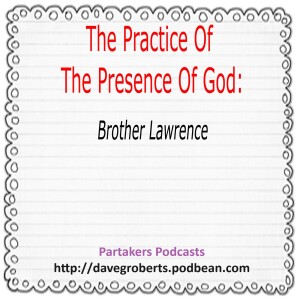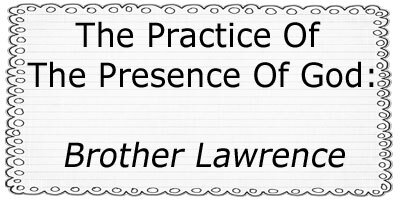
432.4K
Downloads
3357
Episodes
G’day and welcome to Partakers Christian Podcasts! Join us for uplifting Bible teaching, inspiring readings, heartfelt worship, powerful prayers, and fascinating church history. Whether you’re new to faith or growing deeper in your journey, we’re here to encourage and equip you. 🎧 Tune in, interact, and be inspired—wherever you are in the world.
G’day and welcome to Partakers Christian Podcasts! Join us for uplifting Bible teaching, inspiring readings, heartfelt worship, powerful prayers, and fascinating church history. Whether you’re new to faith or growing deeper in your journey, we’re here to encourage and equip you. 🎧 Tune in, interact, and be inspired—wherever you are in the world.
Episodes

Monday Jun 17, 2024
The Practice Of The Presence Of God - Brother Lawrence Part 4
Monday Jun 17, 2024
Monday Jun 17, 2024

The Practice Of The Presence Of God:
The Best Rule Of A Holy Life
G’day! Welcome to Partakers! Today we continue our Sunday series, where we are reading from a book by Brother Lawrence “The Practice of the Presence of God”… This book is available for you to freely download at various websites!
Hearty renunciation.
Prayer and praise prevent discouragement.
Sanctification in common business.
Prayer and the presence of God.
The whole substance of religion.
Self-estimation.
Further personal experience.
That we need only to recognize GOD intimately present with us, to address ourselves to Him every moment, that we may beg His assistance for knowing His will in things doubtful, and for rightly performing those which we plainly see He requires of us, offering them to Him before we do them, and giving Him thanks when we have done.
(The downloadable audio continues the conversation...)
Right Mouse click or tap here to save this as an audio mp3 file

Sunday Jun 16, 2024
The Practice Of The Presence Of God - Brother Lawrence Part 3
Sunday Jun 16, 2024
Sunday Jun 16, 2024

The Practice Of The Presence Of God:
The Best Rule Of A Holy Life
G’day! Welcome to Partakers! Today we continue our Sunday series, where we are reading from a book by Brother Lawrence “The Practice of the Presence of God”… This book is available for you to freely download at various websites!
Outward business no detriment.
Perfect resignation the sure way.
That when sometimes he had not thought of GOD for a good while, he did not disquiet himself for it; but after having acknowledged his wretchedness to GOD, he returned to Him with so much the greater trust in Him, by how much he found himself more wretched to have forgot Him. (The downloadable audio continues the conversation...)
Right Mouse click or tap here to save this as an audio mp3 file

Saturday Jun 15, 2024
The Practice Of The Presence Of God - Brother Lawrence Part 2
Saturday Jun 15, 2024
Saturday Jun 15, 2024

The Practice Of The Presence Of God:
The Best Rule Of A Holy Life
G’day! Welcome to Partakers! Today we continue our Sunday series, where we are reading from a book by Brother Lawrence “The Practice of the Presence of God”… This book is available for you to freely download at various websites!
Love is to be the motive of all. Once in fear, now in joy. Diligence and love. Simplicity the key to Divine assistance. Business abroad as at home. Times of prayer and self-mortification not essential for the practice. All scruples brought to God. (The audio continues the conversation...)
Right Mouse click or tap here to save this as an audio mp3 file

Thursday May 09, 2024
Psalm On Demand - Psalm 1
Thursday May 09, 2024
Thursday May 09, 2024
Psalm 1
1 Oh, the joys of those who do not follow the advice of the wicked,
or stand around with sinners,
or join in with mockers.
2 But they delight in the law of the Lord,
meditating on it day and night.
3 They are like trees planted along the riverbank,
bearing fruit each season.
Their leaves never wither,
and they prosper in all they do.
4 But not the wicked!
They are like worthless chaff,
scattered by the wind.
5 They will be condemned at the time of judgment.
Sinners will have no place among the godly.
6 For the Lord watches over the path of the godly,
but the path of the wicked leads to destruction.
Click or Tap here to listen to or save this as an audio mp3 file

Tuesday Apr 16, 2024
Testimony - Why I am a Christian
Tuesday Apr 16, 2024
Tuesday Apr 16, 2024

Why I am a Christian?
Right mouse click to save/download this testimony as a MP3 file
The Apostle John, writing in 1 John 5:9-12 - "We accept man's testimony, but God's testimony is greater because it is the testimony of God, which he has given about his Son. Anyone who believes in the Son of God has this testimony in his heart. Anyone who does not believe God has made him out to be a liar, because he has not believed the testimony God has given about his Son. And this is the testimony: God has given us eternal life, and this life is in his Son. He who has the Son has life; he who does not have the Son of God does not have life."
Why Is It So?
Why I am a Christian?
God had been pursuing me
In my more smug moments I used to congratulate myself for being a Christian. How proud I was that I, was a Christian and that God was a jolly lucky God that I had decided to follow Him. It was during one of my less self-deluded moments, that I examined myself and I found God pricking my conscience and correcting me, and I read the New Testament "For the Son of Man came, not to be served but to give His life as a ransom for many" (Mark10:45).
Right mouse click or tap here to save/download this testimony as a MP3 file

Friday Apr 12, 2024
Friday Prayers - Augustine
Friday Apr 12, 2024
Friday Apr 12, 2024

Partakers Friday Prayers!
We pray together and when Christians pray together, from different nations, different churches and different denominations - that reveals Church unity! Come! Let us pray together!
Let us pray earnestly this prayer together to our great God!
Look upon us, O Lord,
and let all the darkness of our souls
vanish before the beams of Your brightness.
~
Fill us with holy love,
and open to us the treasures of Your wisdom.
~
All our desire is known by You,
therefore perfect what You have begun,
and what the Spirit has awakened us to ask in prayer.
~
We seek Your face,
turn Your face toward us
and show us Your glory.
~
Then shall our longing be satisfied,
and our peace shall be perfect.
Amen
Augustine (354-430AD)
Right mouse click to save this Podcast in MP3.
Click on the appropriate link below to subscribe to this website
Subscribe via iTunes

Sunday Mar 10, 2024
Bible Thought - WOW Word 26 - Idolatry
Sunday Mar 10, 2024
Sunday Mar 10, 2024

WOW Word - Idolatry
Images of Idolatry
I wonder if you are like me and when you hear the word idolatry, you imagine somebody bowing before a statue and worshipping it. A good example is the story of the Israelites worshipping the golden calf, as recorded by Moses in Exodus 32. Or perhaps in our own time when seeing people bow down to the statue of the Buddha or one of the many Hindu gods.
Therefore, we tend to think that idolatry is worshipping statues or worshipping in other religions such as Islam, Jainism and Zoroastrianism. However, the Bible is very clear, certainly Jesus was, that idolatry is a threat to living and partaking of the Christian life. How can that be, you may very well ask?
Christian Idolatry
As a Christian, you are to love God and love others. Anything that replaces your love of God as your first priority, is an idol, and therefore, is idolatry. For idolatry is not merely worshipping statues. Idolatry is the transference of allegiance to something apart from God. It is worshipping created things, and not worshipping God the Father through Jesus Christ the Son of God in the power of the Holy Spirit.
Idolatry can be anything! For anything can take first place in your life! It may be your computer, your car, your books, your family, your church, a Christian leader, entertainment, celebrities and even love of yourself! These are all good things, in and of themselves, but they are not good things if they remove God from first priority in your life. These things can turn out to be idols, because they relegate your thinking of Almighty God to below first place.
Idolatry is the mind’s sin
Paul writes to the Roman church in Romans 1:18-25
"The wrath of God is being revealed from heaven against all the godlessness and wickedness of people, who suppress the truth by their wickedness, since what may be known about God is plain to them, because God has made it plain to them. For since the creation of the world God’s invisible qualities – his eternal power and divine nature – have been clearly seen, being understood from what has been made, so that people are without excuse.
For although they knew God, they neither glorified him as God nor gave thanks to him, but their thinking became futile and their foolish hearts were darkened. Although they claimed to be wise, they became fools and exchanged the glory of the immortal God for images made to look like a mortal human being and birds and animals and reptiles.
Therefore God gave them over in the sinful desires of their hearts to sexual impurity for the degrading of their bodies with one another. They exchanged the truth about God for a lie, and worshipped and served created things rather than the Creator – who is for ever praised. Amen."
In that passage of scripture, Paul links idolatry with immorality. Immorality is the outer sins and idolatry is the inward sin. Idolatry is an attitude inside you that says to God “You are not first place, this other thing is”. Somebody who commits the sin of idolatry is a slave to that something else, and is not a slave to God through Jesus Christ in the power of the Holy Spirit. Therefore, idolatry is not just worshipping in another religion and bowing down to statues. Idolatry is relegating God to second place, in both actions and attitudes. Therefore cast off anything that is blocking your relationship with Almighty God. As idolatry is primarily the sin of the mind, those depraved ideas turn to sins of lusts and idolatrous physical pleasures. Be renewed in your thinking and have a renewed mind, so that you can worship Almighty God through Jesus Christ the Lord, in the power of the Holy Spirit.
How’s that for a WOW Word?
Right mouse click or tap here to download this as a mp3 file

Thursday Feb 22, 2024
So Great A Salvation Part 12
Thursday Feb 22, 2024
Thursday Feb 22, 2024
So Great A Salvation
Part 12 - Overcoming Doubt
Confess
Confess your doubt as sin to God, and He will listen and cleanse you (1 John 1:9). If doubts persist, try talking to somebody whom you trust and confess to them your doubts, and they may well be able to help you (James 5:16).
Salvation
Have assurance of salvation. Be assured and let your mind be controlled by the Holy Spirit, so that you are not led astray. Your salvation rests on nothing apart from God’s promises and Jesus’ righteousness! Test yourself as Paul exhorts in 2 Corinthians 13:5.
Righteousness
Live a righteous life. Live the truth! When we started as Christian Disciples, before God we were given the righteousness of Jesus! But that righteousness needs to be lived out in the lives of Christian Disciples. Living right helps overcome any doubts!
Faith
Show total trust in God for your life. The faith we have is a defensive weapon against the mistruths, the doubts, that enter our minds. By maintaining our trust in God’s promises and God’s power, doubts are extinguished.
Bible
Read and study God’s Word so as to know, understand and live truth. Our lives are to be controlled by truth as revealed in Bible. When we know truth really well, we can recognize the lies that we are told! The Word of God, the Bible, is there to be studied diligently so that by trusting in the Holy Spirit to lead and reveal it to us, we get to know God and His promises! We are to grow in grace and in the knowledge of Jesus according to 2 Peter 3:18 and that is only achieved through studying the Bible! Then when we hear that nagging little voice that says “God didn’t say that”, we can say “Oh yes, He did!!”
Prayer
Talk to God. This is how we are energized! Fighting doubt in our own power is useless! Ask Him to help you overcome your doubts, and He will help you! When we talk to God, we strengthen our relationship with Him! When we ask other Christian Disciples to pray for us, Church unity is strengthened! When we see God answer prayer, our faith is matured and doubts are easily cast aside.
Click or Tap here to listen to or save this as an audio mp3 file

Wednesday Feb 21, 2024
So Great A Salvation Part 11
Wednesday Feb 21, 2024
Wednesday Feb 21, 2024
So Great A Salvation
Part 11 - When Doubt Sets In
It is a very rare person indeed who has not suffered some form of doubt, and asked questions similar to those of Jeremiah in the passage of Lamentations I read earlier. By doubt, I do not mean as in doubting God’s very existence, but rather doubting some aspect of the Christian life such as assurance of salvation, any of the other of God’s promises or doubting an attribute of God such as His innate sovereignty or His infinite goodness.
When doubt rises in you concerning God’s assured promise of salvation of you that usually occurs after engaging in wilful sin or having lost a spiritual battle. Doubting God’s sovereignty will usually occur after experiencing a great personal tragedy or of reading about an international disaster. When this occurs, it is important to have faith. Have faith in your knowledge of Scripture, and trust in its authority as God’s Word. When we sin, not only do we forget who we are as His children, but we also doubt what God has said is true in the Bible. The Christian Disciple learns to believe and trust God regardless of circumstances however divergent the experience is or was.
The originator of a lot of doubt in the life of a Christian Disciple is Satan, just as it was for Adam in the Garden of Eden (Genesis 3:1). Remember that Satan roams the earth like a devouring lion in order to stop Christian Disciples trusting in God and their testimony about God’s goodness (1 Peter 5:8).
Another source of doubt is the world we live in, with its own moral codes and perceived wisdom contrary to that of God expressed in the Bible. Whereas the Christian Disciple gains wisdom from God through having the indwelling Holy Spirit and reading the Bible, the world often has wisdom that is contrary. One only has to look at the perceived wisdom of atheistic scientific materialism countering the Christian arguments.
One final source of doubt, is the spiritual immaturity of the Christian Disciple. Doubting whether prayer works is often down to being double minded (James 1:8). Elsewhere Paul writes that doubt arises because of not knowing the basic doctrines of God (Ephesians 4:14). This source of doubt is only defeated through experience and having a maturing, disciplined life of obedience through prayer, studying the Bible and allowing the Holy Spirit to transform. In doing these things, the relationship between God and a Christian Disciple is nurtured and growing.
Next Podcast, we conclude this series, with the topic of overcoming doubt in the life of the Christian Disciple
Click or Tap here to listen to or save this as an audio mp3 file

Tuesday Feb 20, 2024
So Great A Salvation Part 10
Tuesday Feb 20, 2024
Tuesday Feb 20, 2024
So Great A Salvation
Part 10 - Dealing with Doubts
When you became a Christian, you started an exciting journey in the Christian life. Success in the Christian life is not an accident, but rather it is a direct result of living in harmony with the basic principles of life set forth in the Bible. The Christian life is not a matter of expecting spiritual maturity to occur overnight. The Bible lays down standards and principles of living which we need to follow with God’s strength, if we are to continue living at peace with God, our fellow men, and ourselves. We need to know what God expects of us and what guidelines He has given us to achieve this quality of life. As we apply the principles and guidelines of the Bible to our lives, we are transformed into the likeness of Christ – which is the journey we are on (Romans 8:28-29; 2 Corinthians 3:18).
Jesus said ‘I have come to bring them life in all its fullness’ (John 10:10). This is achieved as we allow Jesus Christ to live this life through us so that we start to think and respond like He does, to the people and circumstances around us. We need to learn how to see circumstances and people from God’s perspective, rather than reacting on the basis of feelings. When we respond to circumstances on the basis of our feelings that is when conflict, stress, tension and depression enter. When we respond to circumstances by looking from God’s perspective, it builds and shows a transformed character as we become more like Jesus.




